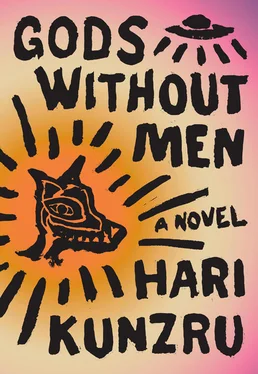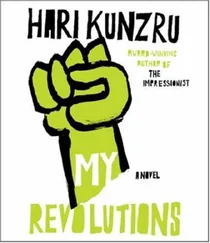“I don’t understand you,” she said to Laila one day.
“What do you mean?”
“You’re a beautiful girl. You could make something of your looks. Why dress like this? All this black?”
“I like it.”
“But what about your family? Do you think of them? Why do they allow it?”
“I do what I want, OK? Just because I don’t dress like a Muslim Barbie.”
There was a reason, of course. For the black clothes, the music. When Laila had first arrived in the U.S. she’d felt lost. All she could think about was her father. She couldn’t sleep, and didn’t eat, even when Aunt Sara tried to tempt her with her favorite dishes. She remembered with shame how she used to behave, pushing her plate away, telling her aunt that the biryani didn’t taste right, the burek was too salty. What she meant was that they didn’t taste like Mama’s cooking. She couldn’t understand why her mother hadn’t come to America. She’d been so keen to leave Iraq. When Laila could get through on the phone she’d try to persuade her to hurry. “I’m scared for you,” she’d say. “I miss you so much.” But somehow Mama always made excuses. Laila shouldn’t worry. She was fine. She’d come soon.
“When?”
“Soon.”
“Promise?”
“I promise.”
But she didn’t come. And gradually the tone of the phone calls changed. She started saying how things were getting better in Baghdad, how the city was safer, with fewer explosions and more regular electricity.
“So do you want us to come back?”
“No, darling. Not yet.”
“Well, then, when will you come here?”
“One day.”
What did she mean, “one day”? Auntie Sara and Uncle Hafiz were kind and patient, but often in that first year Laila would wake up screaming in the middle of the night. Once she even wet the bed, like a baby. Jamila would sit up with her and Laila would cry on her shoulder and confess how much she missed her mom. Why wasn’t she coming? Jamila said it was to do with visas. Uncle Hafiz had a friend, some bigshot Republican who’d arranged things so she and Samir had a temporary right to remain in the country. This big shot was also helping them with their applications for permanent residence. But with Mama there were complications. Baba had joined the Ba’ath Party so he could get a promotion. His widow was listed as a “sympathizer.”
“So we’ll come back,” Laila pleaded, sobbing into the phone.
“No, darling. That’s not a good idea. There’s nothing for you here anymore.”
Gradually San Diego came to seem normal. The city was exciting; a life that had once been contained inside the rectangle of the TV screen was now spilling out all around her. There were Rollerbladers and convertibles and bikinis and Big Gulp drinks. School was tough. She’d never had to sit in a class with boys before and the other girls were so intimidating that at first she didn’t say anything to anyone. People thought she couldn’t understand English and spoke to her slowly, making hand gestures and exaggerating the words. Most kids thought she lived in a tent and rode camels. She couldn’t believe the Americans were making a war in a place they didn’t seem to know a thing about. When she tried to explain, even the clever ones just wanted to talk about suicide bombers and their stupid 9/11, as if the people in New York were the only ones who’d ever died in the whole world. She lost her temper once and shouted at some football players, who were taunting her in the school cafeteria. “We weren’t savages! We had television! I saw Cosby Show, Saved by the Bell !” She couldn’t understand why they found this so funny.
Though she was angry, she was jealous too. She wanted to be an American girl, to be confident and loud and know why it was funny to have seen Cosby Show . The nicest girls at school were the misfits, the ones who wore black and seemed at least to have been bruised by life, instead of being unwrapped like pink cakes every morning before school, fresh and stupid and untouched by human hand. She’d always loved music, so she began to find out about the bands the misfit girls liked, with their lyrics about feeling empty and crying on the inside and being scarred and shattered and wanting to die. She too was an angel without wings. Her heart was in a million pieces. For the first time in her life she had an allowance, and, since her uncle and aunt felt sorry for her, they didn’t stop her from buying big boots and plucking her eyebrows and ringing her eyes with black so she looked like a panda bear. Aunt Sara was appalled, but Uncle Hafiz liked the idea of bringing up a modern teenager. In some ways he even encouraged her; the henna tattoos and briefly purple hair were proof they were an American family, not stupid immigrants who didn’t appreciate the freedoms of their adopted country.
The whole emo thing was fine while they were still in San Diego, but Uncle’s sudden decision to bring them out to the ass end of the universe meant she and Samir had to deal with redneck kids who called them raghead and Saddam and sand-nigger. And though the goth clothes and the overwrought music had begun to seem a little ridiculous, they were hers, and she’d found them by herself, and no one could ever take that away from her.
The weeks went by. The first rotation ended and the clerical major and his troops were deployed to Iraq. Laila and the others watched them leave, then she spent a week back home, trawling the thrift store and hanging out with Samir, who was distant and sullen and kept disappearing to his room to take calls from some girl. Together they watched a lot of TV. One afternoon, still in their pajamas, they sprawled in front of a talk show, watching the presenters discuss the latest twists in the Raj Matharu case, speculating whether the parents were responsible for whatever had happened to their son. They didn’t say anything about Nicky Capaldi, though the blogs were reporting that he was in rehab in England and had vowed never to tour America again unless he received a formal apology from the government. So far the White House didn’t seem to have made that a priority. Fans were getting up a petition, but she didn’t feel like signing. While the TV presenters swapped theories, she opened Samir’s laptop and they watched a YouTube interview with the Matharus, who wore pastel shirts in complementary colors and held hands and did their best to counter the rumor that they were Satanic pedophile child traffickers.
“So you think they did it?” asked Samir, throwing peanuts up into the air and trying to catch them in his mouth.
“No.”
“I do. That woman looks like a crack whore.”
“You wouldn’t look so good if your child was missing.”
“I wouldn’t be having no stupid assburgers kid in the first place.”
“Well, if you did.”
“I just wouldn’t. That’s all.”
She was almost relieved when it was time to go back to the village.
The major in charge of the new BLUEFOR rotation was very different from the last one. He looked like a cartoon soldier, an injection-molded plastic warrior, flattopped, bug-eyed and steroidal. He made a big show of force on the first day, driving into the village at the head of a convoy, blaring the theme from Lawrence of Arabia out of speakers mounted on his Bradley. But despite his confidence, his troops were still incompetent, sheepishly drawling their mispronounced greetings and shooting randomly into crowds. Before long the hearts and minds of Wadi al-Hamam had been lost once again, and Heather was instructing the villagers to stone him when he came by to inaugurate the imaginary new cement factory.
One day Uncle Hafiz starred in a beheading video. They shot it inside the mosque because it was the most sinister spot in town. All the insurgents wanted to take part, so Lieutenant Alvarado held a casting call and whittled them down to the six he thought looked most terroristical. The video was for Al-Mojave, a fake TV channel broadcast to the troops in their mess hall, which provided their main feedback on the progress of the simulation. The Al-Mojave reporters would sometimes show up and interview the villagers about how pro-American they were feeling. They particularly liked Noor, who had a good line in wailing and angry denunciations. Uncle Hafiz had been collaborating with the occupier, so he’d been kidnapped from his office in a dramatic dawn raid. He’d spent the day watching Vietnam movies with the insurgents while the flattopped major directed fruitless house-to-house searches. Uncle Hafiz’s death (reported Al-Mojave) would be a major setback for BLUEFOR, since it called into question their ability to provide security in their sector. As far as Laila was concerned, they couldn’t provide snacks and dips for their sector, let alone security, but she supposed this was the sort of thing they needed to find out before they went to Iraq and did it for real. She and Noor watched the beheaders get ready. They were even more ridiculously dressed than usual; one of them had lost his dishdasha and was wearing a Little Mermaid beach towel wrapped around his waist. Uncle Hafiz was willing to help them sort out their keffiyehs but was hampered by the fact that his hands were cuffed behind his back.
Читать дальше












